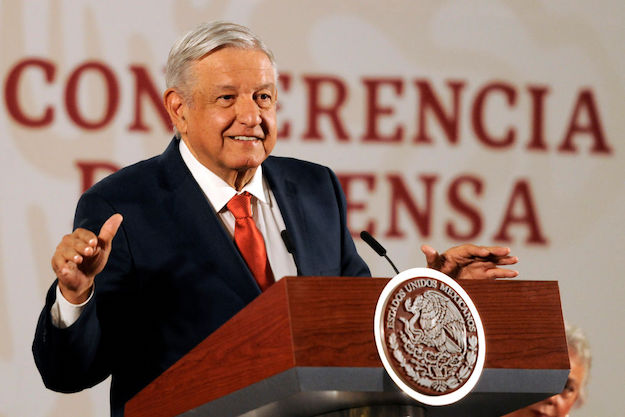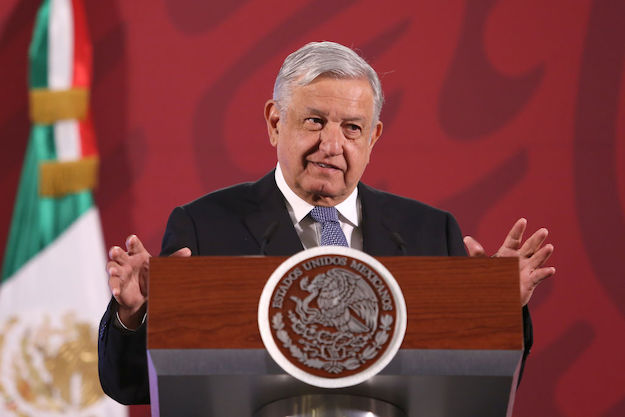MEXICO CITY – Mexico’s President Andrés Manuel López Obrador (AMLO) recently compared his planned economic response to the coronavirus to FDR’s handling of the Great Depression.
“(Roosevelt) reactivated the economy with investment, employment for everybody, a minimum wage … Why not do the same thing now?” the president told reporters Monday, a day after unveiling plans to soften the economic blow of the outbreak.
But experts say the proposals presented by the government fall well short of the large-scale response Mexico needs in order to weather the crisis, setting the country apart in a region that is broadly pursuing substantial fiscal stimulus measures.
“It’s just another instance of AMLO shaping history to fit his message,” Viridiana Ríos, a Mexican political analyst, told AQ. “The New Deal was the absolute opposite of what he is doing.”
While several of Latin America’s other major economies have announced billions in new spending and wide-ranging tax incentives, most of AMLO’s proposals amount to credit extensions, the expansion of existing jobs programs in sectors such as agriculture, and early disbursements for social subsidies that were already in place before the crisis.
“It’s estimated Mexico will need 2-3% of GDP in new spending to deal with the economic fallout of the crisis, but many of the measures announced aren’t actually new,” Rodolfo de la Torre, director of social development at Mexico City-based think tank CEEY, told AQ.
The Mexican government recently revised its pre-outbreak projection of a 0.7% budget surplus down to a deficit of just -0.4% in light of the virus, suggesting the size of its response will indeed trail others in the region. Meanwhile, Brazil has announced a stimulus package amounting to 3.5% of GDP, Chile nearly 5% and Peru 12%. Even cash-strapped Argentina has pledged $11 billion – above 1% of GDP – in stimulus spending.
The Mexican government’s most recent projection shows that the economy could shrink by as much as 3.9% this year. According to a JPMorgan analysis, the lack of tax measures included in AMLO’s plan, along with his insistence that Mexico continue to try to boost oil production despite the fall in crude prices, could lead to a “longer and deeper recession.”
Efforts to inject liquidity into the economy have been hampered by López Obrador’s resistance to take on new debt to finance public spending. AMLO says the measures announced Sunday will be paid for with money previously allocated to public trusts, called fideicomisos, and by tapping the government’s rainy day fund, $5 billion of which was used to cover revenue shortfalls in 2019. The president has also stressed the need for the private sector to shoulder part of the load by supporting a “new Marshall Plan.”
According to Duncan Wood, director of the Wilson Center’s Mexico Institute, it’s unlikely that business will be in position to invest to the degree that AMLO is expecting, or that the funding sources the government has identified will be enough to meet Mexico’s needs.
“A lot of the money from the fideicomisos can’t be touched according to law,” Wood told AQ. “And the money that they can use will disappear in an instant, particularly if it’s used, as AMLO suggested, to put into (state-oil firm) Pemex.”
The resistance to debt has been a feature of AMLO’s administration since he took office in 2018. While often attributed to the need for his (nominally leftist) administration to ease financial markets’ fears, López Obrador’s continued reluctance to increase public spending, even in the face of a pandemic, may reflect his experience of Mexico’s past economic crises, according to Ríos.
“He is interpreting this as another instance in which debt could be used to favor the wealthy and the Mexican billionaires and the plutocracy,” Ríos said, citing the 1982 debt crisis that led to the privatization of state-owned industries and helped create a class of super-wealthy business owners with whom AMLO has done battle since his early days as a politician.
According to Wood, the reluctance to implement a meaningful stimulus package, along with López Obrador’s recent comment that the crisis had fallen “like a ring on his finger,” suggest that López Obrador may see in the coronavirus a means of quickening his plans to transform Mexico’s economy in his own statist image.
“He wouldn’t exactly grieve the loss of the capitalist economy,” Wood told AQ. “If the government is the only major economic actor left standing, then everybody depends on you.”









